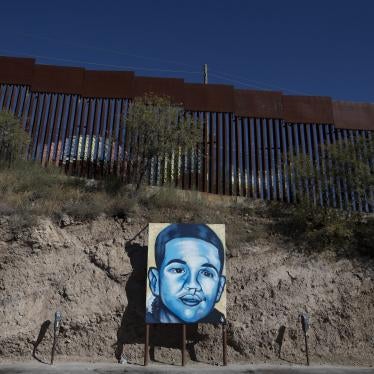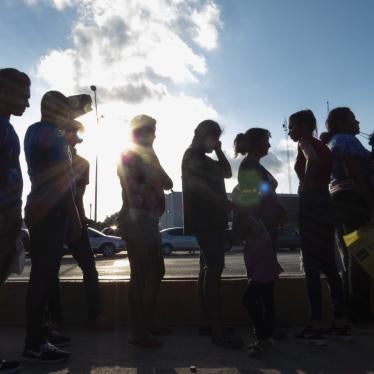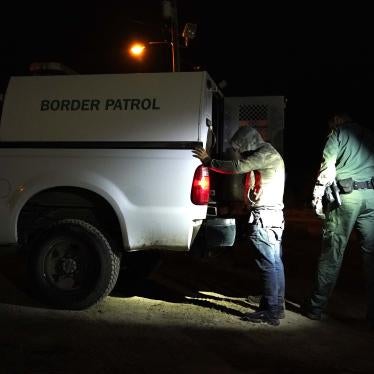October 24, 2022
Julissa Mantilla Falcón, President of the IACHR
Edgar Stuardo Ralón Orellana, First Vice-President of the IACHR
Margarette May Macaulay, Second Vice-President of the IACHR
Esmeralda Arosemena de Troitiño, Commissioner of the IACHR
Joel Hernández García, Commissioner of the IACHR
Roberta Clarke, Commissioner of the IACHR
Carlos Bernal Pulido, Commissioner of the IACHR
Tania Reneaum Panszi, Executive Secretary of the IACHR
Organization of American States
1889 F St NW
Washington, D.C., 20006
Re: Support for petitioners in case of Family Members of Anastasio Hernández Rojas v. United States, Case No. 14.042
Dear Honorable IACHR Commissioners and Executive Secretary Reneaum Panszi:
We, the undersigned 208 organizations, write in support of the family of Anastasio Hernández Rojas in their petition before the Inter-American Commission on Human Rights (IACHR) in their claim that the United States has historically and systemically used the power of the state to kill community members, cover it up, and deny families access to justice. Anastasio is one of thousands that have been killed by law enforcement in the United States with near total impunity in large part because the standards for use of force are inadequate and the mechanisms for accountability are weak. This disproportionately affects Black and Brown men, women, and children whose human rights have been violated and whose lives continue to be at risk because of the unchecked power of the state.
We stand with the family of Anastasio, who was brutally killed in 2010 in San Ysidro, California by agents of the nation’s largest law enforcement agency, U.S. Customs and Border Protection (CBP). Since Anastasio’s death, nearly 250 people have died in encounters with CBP, the majority of whom are Black and Brown people from countries including Angola, Brazil, Colombia, Cuba, the Democratic Republic of the Congo, Ecuador, El Salvador, Guatemala, Haiti, Honduras, Mexico, Nicaragua, Venezuela, and the United States. These deaths are some of the thousands of deaths that have occurred year over year since 1924, when the United States established its first border enforcement agency, the U.S. Border Patrol, which is now part of CBP. In the near century that the United States has had border agents, few border agents have been charged and zero agents — none — have been convicted for any of the thousands of lives taken using the power of the state.
As the Anastasio case points out, the abuse and impunity in the United States are endemic to a justice system designed to protect law enforcement, not the communities they are sworn to serve.
The Petitioner’s Additional Observations detail that on May 28, 2010, more than a dozen border agents surrounded Anastasio while he was handcuffed, hog-tied, and in the prone position on the ground. They beat him, shot him repeatedly with a Taser, and then put him into a positional asphyxiation position with an agent leaning on top of him until he stopped breathing. These acts constitute torture. The impunity began with border agents dispersing witnesses, erasing cell phone videos, intervening in the autopsy and investigative interviews, destroying government video, altering government documents, mishandling evidence, and acting at every turn to obstruct justice.
This obstruction was not an aberration, but rather, the norm for CBP, which has illegally operated cover-up units called ‘Critical Incident Teams’ for decades outside of public view. The Southern Border Communities Coalition (SBCC) revealed the existence of these teams to the public in a letter to the U.S. Congress in October 2021, which prompted several government investigations, currently ongoing, and the elimination of the teams. But the revelations about the cover-up units have not resulted in any accountability. The U.S. government seems poised to absolve border agents of past misconduct and to permit their involvement in future investigations of use of force.
According to the Washington Post, police killings claim the lives of over a thousand people every year in the United States (not including deaths at the hands of border agents). Black and Brown community members are killed at much higher rates than anyone else. They include the high-profile killings of Eric Garner, Tamir Rice, Breonna Taylor, George Floyd and many more. Few officers are ever charged for unjustified killings, and even fewer are convicted because access to justice is fraught with obstacles. The greatest obstacle is how excessive force is defined in the United States. U.S. law condones as “objectively reasonable” force that amounts to torture or excessive use of force under international standards.’ Until and unless the United States’s use-of-force standard changes, the killings by border agents, police, and other law enforcement will continue, and justice will be denied in all but the rare few cases.
The time is now for the IACHR to weigh in.
This is a moment of national reckoning for law enforcement in the United States. Talk of reform permeates the U.S. Congress, state legislatures, city halls, and public square, but meaningful accountability mechanisms have yet to appear. That must change. The unabated violence by law enforcement undermines our safety, our humanity, and civilian control over state power. An examination now by the IACHR of the use-of-force standards and accountability mechanisms at play in the Anastasio case and in effect throughout the United States is timely and could help move us forward to protect human rights.
In border communities, use of force by border agents is on the rise. According to CBP’s own data comparing 2019 and 2022, use-of-force incidents have risen from 592 to 876, even while assaults on officers, which agents claim justifies the force they use, have fallen from 484 to 462. The rise in violence comes at a time when agents at CBP are critical of attempts at reforms, they operate secret social media groups where they make xenophobic, sexist, and racist jokes with few consequences, and the former head of Border Patrol openly threatens rape in response to media reports about his role in the abuse and impunity at the heart of the Anastasio case.
In the days after Anastasio’s life was taken, while the family was still mourning and the community was reeling, the Border Patrol union openly tweeted, “Lesson learned: Don’t fight with Border Patrol,” and “We don’t fight fair, we fight to win.” This is the attitude of an agency then and now, an attitude that reverberates throughout CBP. If this is the unchecked behavior of the nation’s largest law enforcement agency, what can we expect from other agencies? What can we expect from law enforcement in other countries?
Now is the moment to hold CBP and other law enforcement in the United States accountable, and point to the reforms that will open a new chapter, one where human rights and life are paramount and protected at all times for all people. We thank the IACHR Commissioners and Executive Secretary for your consideration of our letter in your deliberations.
Respectfully,
International Organizations/Grupos Internacionales
Al Otro Lado
Alianza Americas
Amazon Watch
American Friends Service Committee
Artists for Amazonia
Border Angels
Border Kindness
Center for Victims of Torture
Al Otro Lado
Comunidad Maya Pixan Ixim
Espacio Migrante
Frontera de Cristo
Fundación para la Justicia (FJEDD)
Hope Border Institute
Human Rights Watch
International Mayan League
International Refugee Assistance Project (IRAP)
Kino Border Initiative
Latin America Working Group (LAWG)
Palestinian Youth Movement Vancouver
Refugee Health Alliance
School of the Americas Watch Educational Fund
Unified US Deported Veterans
Voices from the Border
Washington Office on Latin America (WOLA)
Mexico Organizations/Grupos en México
Alma Migrante, A.C.
ASOCIACIÓN NACIONAL PRO SUPERACIÓN PERSONAL, A.C.
Casa del Migrante, A.C.
Coalición Pro Defensa del Migrante, A.C.
Derechos Humanos Integrales en Acción, A.C.
Instituto para las Mujeres en la Migración (IMUMI), A.C.
United States - National Organizations/Organizaciones Nacionales en los EE. UU.
Advancing Justice - Asian Law Caucus
African Diaspora for Good Governance
American Civil Liberties Union
Asian Pacific American Labor Alliance, AFL-CIO
Black Alliance for Just Immigration (BAJI)
Border Network for Human Rights
Bridges Faith Initiative
Center for Gender & Refugee Studies
CODEPINK
Communities United for Status & Protection (CUSP)
Congregation of Our Lady of Charity of the Good Shepherd, U.S. Provinces
Defending Rights & Dissent
Doctors for Camp Closure
Drug Policy Alliance
Franciscan Action Network
Freedom for Immigrants (FFI)
Government Accountability Project
Haitian Bridge Alliance
Human Rights First
Immigrant Legal Resource Center
Immigration Equality
Immigration Hub
Islamic Circle of North America (ICNA) Council for Social Justice
Japanese American Citizens League
Jobs With Justice Education Fund
Justice In Motion
League of United Latin American Citizens (LULAC)
Liberated Ethnic Studies Model Curriculum Consortium
Maryknoll Office for Global Concerns
Mijente
MPower Change Action Fund
National Advocacy Center of the Sisters of the Good Shepherd
National Immigrant Justice Center
National Immigration Law Center
National Immigration Project (NIPNLG)
National Justice For Our Neighbors
National Latino Research Center
National Lawyers' Guild
National Network for Immigrant and Refugee Rights
NETWORK Lobby for Catholic Social Justice
OCA - Asian Pacific American Advocates
Partnerships for Trauma Recovery
Presente.org
Progressive Labor Alliance
Project On Government Oversight
Quixote Center
Restaurant Opportunities Center (ROC) United
Sisters of Mercy of the Americas Justice Team
Southern Border Communities Coalition
Sunita Jain Anti-Trafficking Initiative
Tsuru for Solidarity
United We Dream
Veterans For Climate Justice
Veterans for Peace
Witness at the Border
Women's Refugee Commission
United States - Regional Organizations/Organizaciones Regionales en los EE. UU.
ACCESS REPRODUCTIVE JUSTICE
Activist San Diego
AILA San Diego Chapter
Alliance San Diego
American Federation of Teachers, Local 1931
Another Gulf Is Possible Collaborative
Arizona Justice For Our Neighbors
Arizona Palestine Solidarity Alliance
Asian Solidarity Collective
Association of Raza Educators
Austin Region Justice for Our Neighbors
AZ Immigration Alliance
Border Patrol Victims Network
Border Workers United
Borderlands for Equity
Buen Vecino
California Central Valley Journey for Justice
California Coalition for Women Prisoners
California Collaborative for Immigrant Justice
California Immigrant Policy Center (CIPC)
California Physicians Alliance (CaPA)
Casa Familiar
Causa Justa :: Just Cause
Center for Justice & Reconciliation at PLNU
Central Valley Immigrant Integration Collaborative
Centro Cultural de la Raza
Centro Del Inmigrante
Children's Defense Fund-California
Chula Vista Partners in Courage
Coalición de Derechos Humanos
Coalition for Humane Immigrant Rights (CHIRLA)
Comité Cívico del Valle
Communities United for Restorative Youth Justice
Community Advocates for Just and Moral Governance (MoGo)
Community Asylum Seekers Project
Community United Against Violence (CUAV)
Comunidad de Apoyo San Diego
Contra Costa Immigrant Rights Alliance
Council of Equity Advocacy San Diego
CSA San Diego County
Cville Immigrant Freedom Fund
Dorothy Day Catholic Worker, Washington DC
DRUM - Desis Rising Up & Moving
Ella Baker Center for Human Rights
Employee Rights Center
Faith Coalition of La Mesa (CA)
Florida Immigrant Coalition (FLIC)
Grassroots Leadership
Harbor Institute for Immigrant and Economic Justice
Humane Borders, Inc.
Immigrant Defenders Law Center
Indivisible San Diego Persist
Inland Coalition for Immigrant Justice
Interfaith Welcome Coalition - San Antonio
Jakara Movement
Jewish Family Service of San Diego
Justice For Our Neighbors North Central Texas
La Unión del Pueblo Entero (LUPE)
LifeLong Medical Care
Long Beach Immigrant Rights Coalition (LBIRC)
Mainers for Humane Immigration
Maternal and Child Health Access
Mosques Against Trafficking
New Hampshire Conference United Church of Christ, Economic Justice Mission Group
New Mexico Dream Team
NorCal Resist
North County Equity and Justice Coalition
North County LGBTQ Resource Center
Orange County Equality Coalition
Orange County Justice Fund
Orange County Rapid Response Network
Our Roots Multi-Cultural Center
Palomar Unitarian Universalist Fellowship
Partnership for the Advancement of New Americans
Pilgrim United Church of Christ, Carlsbad CA
Pilipino Workers Center of Southern California
Pink Crescent
Promotores Comunitarios del Desierto, Eastern Coachella Valley
Proyecto Azteca
Rise Up San Diego
Rocky Mountain Immigrant Advocacy Network
Samaritanos Sin Fronteras
San Diego Chicano/Latino Concilio on Higher Education
San Diego City College Department of Chicano/a/x Studies
San Diego County Building & Construction Trades Council
San Diego County Coalition on Education
San Diego Immigrant Rights Consortium
San Francisco Public Defender's Office
SB County Immigrant Legal Defense Center
Secure Justice
SEIU United Service Workers West
Services, Immigrant Rights and Education Network (SIREN)
Social Justice Collaborative
South Bay Forum
South Bay People Power
Southern California Immigration Project
St. Mark's Presbyterian Church, Tucson, AZ
Street Level Health Project
Texas Civil Rights Project
The Children’s Partnership
The Green Valley/Sahuarita Samaritans
The Inland Empire Immigrant Youth Collective
The San Diego LGBT Community Center
Trucha
Tucson Samaritans
Unión del Barrio
Unitarian Universalist Refugee and Immigrant Services and Education
UNITE HERE Local 30
United Food and Commercial Workers Local 135
Universidad Popular
University of San Diego's Mulvaney Center
Voces Unidas (Rio Grande Valley)
Wind of the Spirit Immigrant Resource Center
United States - Student Groups/Grupos Estudiantiles en los EE. UU.
Abolish Stanford
La Alianza Law Students of Latin American Descent
La Raza Law Journal
Sexual Violence Free (SVFree)
Stanford Code the Change
Stanford Decarceration Collective
Stanford Students for Affordability
Stanford Students for Workers' Rights
Students for Environmental & Racial Justice







